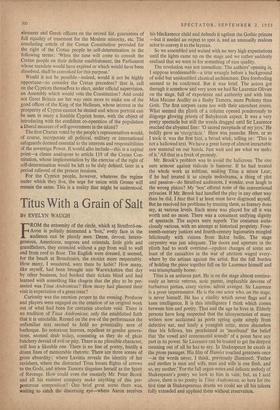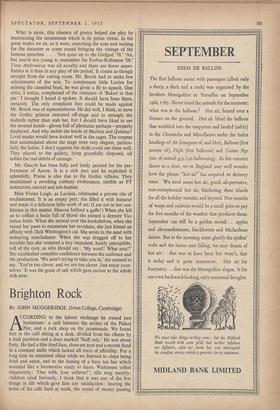Titus With a Grain of Salt
BY EVELYN WAUGH FROM the extremity of the circle, which a, Stratford-on- Avon is politely misnamed a 'box,' every face in the audience can be plainly seen. Dense, devout, hetero- geneous, Americans, negroes and orientals, little girls and grandfathers, they extended without a gap from wall to wall and from roof to floor. The English were dressed, it seemed, for the beach at Broadstairs, the exotics more respectably. How many, I wondered, were there by habit? How many, like myself, had been brought into Warwickshire that day by other business, had booked their tickets blind and had learned with something like chagrin that the play to be pre- sented was Titus Andronicus? How many had planned their visit in expectation of a great treat?
Curiosity was the emotion proper to the evening. Producer and players were engaged on the creation of an original work out of what had been for centuries absolute void. There is no tradition of Titus Andronicus; only the established faith that it is unactable. Reread on the eve of the performance the unfamiliar text seemed to hold no potentiality save of burlesque. Its notorious horrors, repellent to gentler genera- tions, seemed drab today, consisting as they do of plain butchery devoid of evil or pity. There is no plausible character, still less a likeable one. There is no line of poetry, hardly a dozen lines of memorable rhetoric. There are three scenes of gross absurdity : where Lavinia reveals the identity of her ravishers, where the distracted Titus looses flights of arrows to the Gods, and where Tamora disguises herself as the Spirit of Revenge. How could even the masterly Mr. Peter Brook and all his eminent company make anything of this pre- posterous composition? One brief great scene there was, waiting to catch the discerning eye—where Aaron receives his blackarnoor child and defends it against the Gothic princes —but it needed an expert to spot it, and an unusually zealous actor to convey it to the layman.
So we assembled and waited with no very high expectations until the lights came up on the stage and we rather suddenly realised that we were in for something of rare quality.
The revelation was not immediate. The authors' opening is, I suppose irredeemable—a trite wrangle before a background of solid but unidentified classical architecture. Dire foreboding seemed to be confirmed. But it was brief. The actors got through it somehow and very soon we had Sir Laurence Olivier on the stage, full of experience and authority and with him Miss Maxine Audley as a flashy Tamora, more Ptolemy than Goth. The first corpses came too with their attendant mutes. What seemed the plinth of a column opened ponderously to disgorge glowing priests of Babylonish aspect. It was a very pretty spectacle but still the words dragged until Sir Laurence reached the abysmal line : '0 sacred receptacle of my joys.' He boldly gave us `racepitacle.' Here was panache. Here, or so I took it, was the first hint, a broad wink, telling us : `This is not a hallowed text. We have a great lump of almost intractable raw material on our hands. Just wait and see what we make of it.' All that in a freak of prosody.
Mr. Brook's problem was to avoid the ludicrous. The one sure armour against ridicule is humour. If he had treated the whole work as sublime, making Titus a minor Lear; if he had treated it as simple melodrama, a thing of plot and passion—do Stratford audiences, I wonder, ever laugh in the wrong places? My `box' offered none of the conventional privacies. If Mr. Brook had handled the play in any other way than he did, I fear that I at least must have disgraced myself. But he resolved his problems by treating them, as literary dons say, at various levels. Each scene was played for all it was worth and no more. There was a consistent unifying dignity of spectacle. The supers were superb. The costumes auda- ciously various, with no attempt at historical propriety. Four- teenth-century justices and fourth-century legionaries mingled felicitously with visions from Bakst ballet. The stage carpentry was just adequate. The doors and aperture in the plinth had to work overtime—opulent changes of scene are least of the casualties in the war of attrition waged every- where by the artisan against the artist. But the full burden of holding the piece together fell on Sir Laurence himself and was triumphantly borne.
Titus is an arduous part. He is on the stage almost continu- ously as heroic veteran, stoic parent, implacable devotee of barbarous pieties, crazy victim, adroit avenger. Sir Laurence is a great impersonator. He is the one actor who, on the stage, is never himself. He has a vitality which never flags and a keen intelligence. It is this intelligence I think which comes between him and poetry. That and the age he lives in. Elderly persons have long suspected that the idiosyncrasies of many writers now acclaimed as poets spring quite simply from defective ear, and lately a youngish critic, more shameless than his fellows, has proclaimed as 'moribund' the belief that `the vowel and consonantal sounds' of a poem have any part in its power. Sir Laurence can be trusted to get the deepest meaning out of all he has to say. In Shakespeare he excels in the prose passages. His film of Hamlet touched greatness once —in the words never, I think, previously illumined; 'Father and mother is man and wife, man and wife is one flesh, and so, my mother.' For the full organ-notes and delicate melody of Shakespeare's poetry we look to him in vain; but, as I said above, there is no poetry in Titus Andronicus, so here for the first time in Shakespearean drama we could see all his talents fully extended and applaud them without reservation. What is more, this absence of poetry helped the play by maintaining the momentum which is its prime virtue. In the great works we sit, as it were, crunching the nuts and waiting for the decanter to come round bringing the vintage of the famous speeches. . . . 'Not quite up to the Gielgud '38."Ah, but you're too young to remember the Forbes-Robinson '08.' Titus Andronicus was all novelty and there are fewer super- fluities in it than in any play of the period. It comes as though straight from the cutting room. Mr. Brook had to make few adjustments of the text. To compensate little Lucius for missing the cannibal feast, he was given a fly to squash. One critic, I notice, complained of the omission of 'Baked in that pie.' I thought I heard it spoken. It should have been there, certainly. The only complaint that could be made against Mr. Brook was of squeamishness. He did well, I think, to have the Gothic princes executed off-stage and to strangle the midwife rather than stab her, but I should have liked to see the severed hands—gloves full of plasticine perhaps—properly displayed. And why moble the heads of Martius and Quintus? Livid masks would have looked well in the cages. The corpses that accumulated about the stage were very elegant, particu- larly the ladies. I don't suppose the stalls could see them well. They played to the gallery, lying gracefully disposed, all unlike the real debris of carnage.
Mr. Quayle has been fully and justly praised for his per- formance of Aaron. It is a rich part and he exploited it splendidly. Praise is also due to the Gothic villains. They maintained a revolting rubbery exuberance, nimble as PT instructors, amoral and sub-human.
Miss Vivien Leigh, as Lavinia, celebrated a private rite of enchantment. It is an empty part; she filled it with humour and made it a delicious little work of art. (I am not in her con- fidence in this matter. Heaven forfend a gaffe!) When she left us to collect a basin full of blood she mimed a demure Vic- torian bride. When she mewed over the bookshelves, when she raised her paws to enumerate her ravishers, she just hinted an affinity with Dick Whittington's cat. She wrote in the sand with endearing nonchalance. When she was dragged off to her horrible fate she ventured a tiny impudent, barely perceptible, roll of the eyes, as who should say : 'My word! What next?' She established complete confidence between the audience and the production. 'We aren't trying to take you in,' she seemed to say. 'You're too clever, and we are too clever. Just enjoy your- selves.' It was the grain of salt which gave savOur to the whole rich stew.



































 Previous page
Previous page